
PUMPA - SMART LEARNING
எங்கள் ஆசிரியர்களுடன் 1-ஆன்-1 ஆலோசனை நேரத்தைப் பெறுங்கள். டாப்பர் ஆவதற்கு நாங்கள் பயிற்சி அளிப்போம்
Book Free DemoThe lesson is an extract from Dr. Abdul Kalam's autobiography 'Wings of Fire'. He recounts his childhood experiences in this particular extract. He narrates interesting incidents from his own life, that paved way to shape his life. Kalam was born in Rameswaram, which was a part of the Madras Presidency. Unlike today, in earlier days, Madras included most of the Southern Parts of Tamil Nadu, northern parts of Malabar region, Lakshwadeep, Coastal Andhra and several other neighbouring areas. During Kalam's birth, Rameswaram was part of Madras State. He was born in a Tamil middle-class family of Muslims. In today's scenario, Rameswaram belongs to the Ramanathapuram district in Tamil Nadu. It is on Pamban island, separated from Sri Lanka. The Pamban bridge is one of India's most famous railway bridges, which connects Pamban Island and Rameswaram. In the early days, when there was no bridge, ferries transported pilgrims and merchandise across the banks. Kalam's father was also one such person who ferried people.

Pamban Bridge
Kalam's father, being a ferryman, did not have degrees or proper schooling to his credit but was a person who was good at heart. He did not have formal education or wealth. But Kalam emphasises that education has nothing to do with the personality or the goodness that a person possesses. He also had innate wisdom, in the sense that he knew a lot of things, possessed skills and true generosity of spirit. His wife Ashima, Kalam's mother, was a homemaker and helped him by taking care of the house. Although they were not very rich, she made sure to feed a lot of people who needed help. She took care of them like her own family members.
Kalam was the youngest of the family as he had three elder brothers and one sister. He describes himself as a short boy who looks average, in spite his parents being tall. In Rameswaram, they lived in a small house built in the nineteenth century. It was a pucca house, designed to be solid and permanent, made of limestone and bricks. It was on the Mosque street, as it was easy to attend the prayers for them. His father lived a simple life avoiding unnecessary luxuries but ensured all basic necessities like food, shelter and medicines were provided. Kalam recounts that he was both materially and emotionally provided for as a child.

Pucca house
Kalam recounts the time when he was eight years old, living in Rameswaram. It was \(1939\), and the second World War had just broken out. During the war, India was colonised by the British. Most other countries were controlled or ruled by the English. Britain took its stand with the Allied Powers, which included the US, Soviet Union, France etc. Therefore India had no choice but to take the same stance. There was a huge demand for tamarind seeds during the time. Although Kalam did not understand the reason as a child, tamarind seeds were used as an agent for textiles such as jute and cotton. It was also grounded and used as fuel in cars and trucks during the war. As there was a necessity for a lot of vehicles during the war, it fetched good prices in the market.

Tamrind seeds
Kalam used to collect these seeds as they lived in a place that was surrounded by trees. He collected them to sell them to a provisional store in Mosque street, which in turn sold it to customers in bulk quantities putting together all the seeds collected by different people. One day's collection would fetch him one anna. Annas used to be copper paisas, which were equal to 1⁄16 of a rupee in the British period. Kalam's brother-in-law Jallaluddin was a huge influence on him, as he narrated what was happening in the World outside during the war. Since Kalam was only eight, he was not very fluent in reading, so he tried to gain more information from the headlines of Dinamani newspaper.
Kalam believes that when a child is born, they are born with no judgements or preconceived notions about society. Every child is born into a different social, financial, emotional background. A child's upbringing determines his ideologies, thoughts and actions for the rest of his life. Their environment shapes and moulds them. They grow up in a society that has rigid biased rules and beliefs around things like caste, religion and gender stereotypes. For example, as a boy grows up, if he is fed the idea that he is supposed to be tough and crying makes him feminine, he grows up with the same ideology and propagates it to his next generations as well. A child does not know to differentiate between people based on any notions or treat anyone unequally. They are fed these thoughts by parents and society. If he is taught good values from a young age, he will grow up imbibing these values.
Kalam says that he inherited self-discipline and honesty from his father, as he always guided Kalam in the right manner. He saw his father wake up and perform his duties sincerely every day, which impacted him. He learnt to be kind-hearted from his mother Ashima, as she would feed needy people with the little provisions that she had. All his brothers and sisters, too, grew up learning good values from their parents. He had friends in school just like every other kid of his age. He had three close friends Ramanadha Sastry, Aravindan and Sivaprakasan. The three friends were all from upper-caste Hindu families, as did their names indicate. As children, they grew up together without any differences. They did not know what caste or religion even meant. All they cared for was friendship.
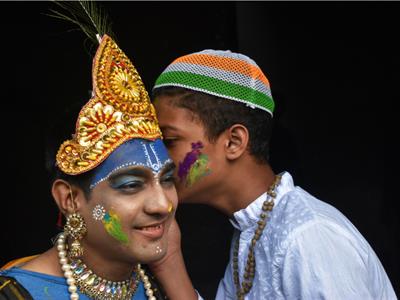
Hindu Muslim kids who are friends*
One of Kalam's friends, Ramanadha Sastry, was, in fact, the son of the high priests of Rameswaram temple, Pakshi Lakshmana Sastry. Kalam emphasises here that India is a country of cultural and religious diversity. We live in unity in spite of our differences. Unless a third party comes into the picture and tries to promote enmity between two diverse groups or inflict all these notions in the minds of children, people can live together ignoring these differences. Ramanadha Sastry went on to take his father's job as a priest in the temple. Aravindan went into the business of arranging transport for visiting pilgrims, as Rameswaram was a famous place for pilgrims to visit, and Sivaprakasan became a catering contractor for the Southern Railways. Kalam underlines the fact that people can be different and still choose to be each other's friends and love each other.
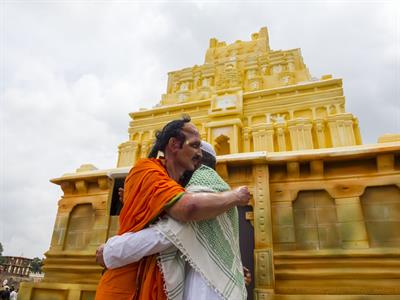
Hindus and Muslims Co-exist**
Kalam very beautifully portrays the cultural diversities and unity among people from different sects of life in Rameswaram. The town was well known for the Arulmigu Ramanathaswamy temple, where Lord Shiva resides. The Kasi Yatra is a very famous ritual for Hindus across the world. It involves visiting all famous temples. Rameswaram is the only major South Indian town to have a temple that plays a predominant role in Kasi Yatra. The other three include Dwarka, Puri and Badrinath, which are located in North Indian states. Of these, Rameswaram is the only Shaivite temple, and the other three are Vaishnavite temples. It is also home to one of the twelve jyotirlingas (The shiva linga), which is believed to have been worshipped by Lord Ram before he set out to wage war with Ravana, and free Sita. Lakhs of pilgrims come from across the World to visit this temple on a daily basis.
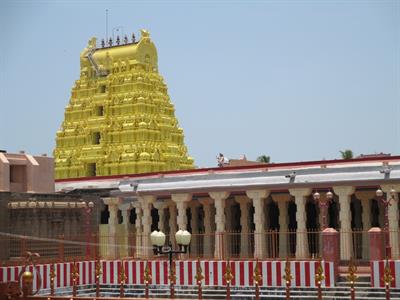
Ramanathaswamy temple, Rameswaram***
Although Rameswaram was a place with temples, it also had people from all other religions co-existing peacefully. Kalam recalls the Shri Sita Rama Kalyanam ceremony when the statue of Lord Ram was carried on a boat to the marriage site in the middle of a pond called Ram Thirtha. A ceremony would be performed on the marriage day of Ram and Sita, and devotees would flock around to watch this. Kalam's family arranged boats with a pedestal for carrying Lord Ram's idol to the pond. His mother and grandmother even narrated stories of Ram along with the life of prophet Mohammad, making him grow into a culturally inclusive person.
Kalam recounts an incident that happened when he was in the fifth standard. Although he was brought up to treat everyone equally, some people did not follow this in their town. A new teacher who had come to the class noticed that Kalam, who was wearing the cap of Muslims, was sitting along with Ramanadha Sastry, who was wearing the sacred thread of the Brahmins. He believed in the hierarchy of caste and religion and ordered Kalam to sit in the last row. Children are not aware of such filthy thoughts or practices that exist in the adult world. Ramanadha Sastry, who did not understand the situation started weeping since he was separated from his best friend. Such instances can leave a scaring image on children's minds as it did with Kalam.
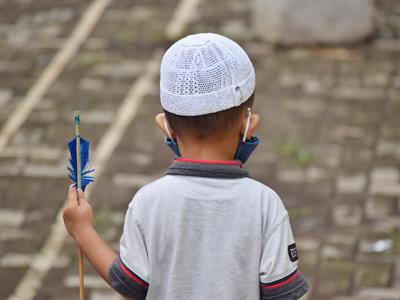
Muslim kid wearing cap****
Kalam and Ramanadha Sastry were very upset about the mistreatment that happened in school. Children tend to look up to teachers to imbibe values. When a teacher who is in such a respectful position makes offensive remarks or propagates inequality, it tends to be etched in the children's minds. They do not understand why it is bad and grow up following the same. They may, in turn, give out these values to people around them. But when they discussed this issue with their parents at home, the parents set a good example by addressing it in front of them. Lakshmana Sastry, the high priest and the father of Ramanadha Sastry summoned the teacher and gave him a warning. He very clearly states that one must not inflict the poison that certain people are superior/inferior to other people, just because they come from a particular community or religion.
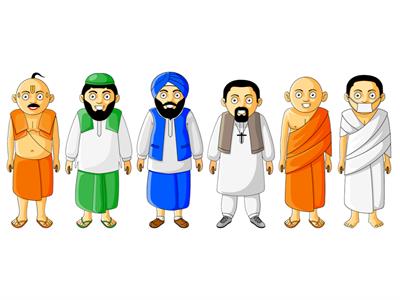
All humans are equal
He calls it poison as it affects the mindset and fills the children's minds with communal intolerance. When someone makes a mistake, it is important to make children understand that one has to apologise. Rather than shouting or yelling at them, one needs to understand that people behave in a particular way because of a lack of awareness. Lakshmana Shasthry makes the teacher understand his mistake and its consequences, thereby making him regret it. The teacher apologises for his behaviour. Shasthry just gave him the option of apologising or quitting his job.
A small sect of Rameswaram discriminated people based on their differences. But Kalam says that his Science teacher Sivasubramania Iyer was unlike the rest of them. Although he was an orthodox Brahmin, he never discriminated anyone but treated everyone equally. He had a wife who did not encourage people from various walks of life to mingle, but he did his best to break all these unnecessary practices. He motivated Kalam to be his best version of himself and reach great heights like those in the big cities.
Kalam recounts a very interesting incident from his life. His science teacher Subramanium Iyer was a rebel who did not stick to the unnecessary practices the society holds or believes in. Once he took Kalam to have lunch with him, to his home. His wife being a very conservative woman, did not like it. She did not want people from other castes or communities to set foot in her kitchen or home where she did pujas and worshipped her deity. People follow these beliefs without even having any purpose. All humans are born equal, and this statement was emphasised by Kalam's teacher as he went into the kitchen, served food by himself, and sat next to Kalam to have his meal with him. He did not shout at his wife in front of the child. Kalam wondered why people held certain prejudices against a particular community. He wondered if there was anything different about his way of eating, drinking water or cleaning up after eating. Every human acts the same, eats the same, and there is no reason for one to treat them separately.
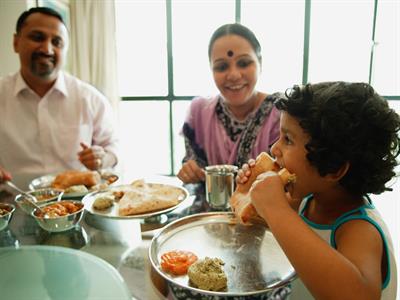
Eating together
The next time his teacher called him for dinner, Kalam was sceptical. But when he went to the house, his teacher had made his wife understand that her way of thinking was offensive. This time she herself took him in and served food. His teacher also makes Kalam understand that these are issues that can only be diminished slowly. Rather than complaining about how one is suppressed, one has to achieve great heights and prove people wrong. Once one decides to change the system, one has to confront these problems.
After the Second World War got over, the British had planned to give independence to India. People like Gandhi and Nehru propagated that Indians will build their own and new India. So there were many opportunities available in India, in big cities, and Kalam wanted to move and study in the district headquarters at that time. His father was a very understanding man as he believes that parents should not/cannot control their children's lives. He compares the moving of his son to explore, to a seagull that travels across the sun alone. He quotes from the most famous Urdu poet Khalil Gibran which says that parents do not own their children, that they are just mediums to bring in a new life that has to serve its purpose in the World. Parents have to nurture and love them. But as they grow up, they have all the right to decide or choose their lives. The quote reads as “Your children are not your children. They are the sons and daughters of Life’s longing for itself. They come through you but not from you. You may give them your love but not your thoughts. For they have their own thoughts.”

Seagulls flying across the Sun
- Hindu Muslim kids*: Papai / Shutterstock
- Hindus and Muslims Co-exist**: Arun Sambhu Mishra / Shutterstock
- Ramanathaswamy temple***: Ssriram mt, CC BY-SA 4.0, via Wikimedia Commons
- Muslim kid wearing cap****: Haidan Abdan Syakuro / Shutterstock
Reference: